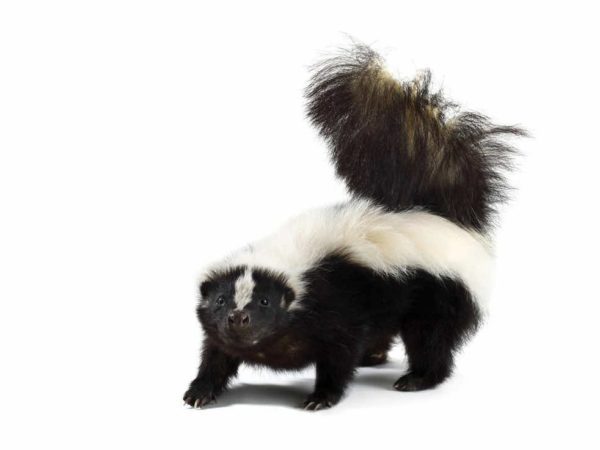Skunks
Description
- Although the most common fur color is black and white, some skunks are brown or grey and a few are cream-colored. All skunks are striped, even from birth. They may have a single thick stripe across back and tail, two thinner stripes, or a series of white spots and broken stripes (in the case of the spotted skunk). Some also have stripes on their legs. Skunks are notorious for their anal scent glands which are used as a defensive weapon. Skunks have two glands one on each side of the anus. These are the glands that produce the foul scented spray which is a mixture of sulfur-containing chemicals. It's so powerful that it can be used to ward off Bears and other much larger predators. The muscles next to the glands allow them to spray at a very high degree of accuracy.
Diet
- Skunks are omnivores. They eat a variety of foods including seeds, nuts, fungi, fruit, and insects.
Size
- Average size is between 13-18 inches in length (not including the tail) and weighs up to 8 lbs.
Habitat
- Striped skunks show little discrimination when it comes to finding a place to live and can be found in both rural and urban areas, as long as a water source is within two miles. Skunks usually do not venture out farther than two miles from their homes, and usually, stay in a range between half a mile and one and a half miles from their dens. These animals also require an ample supply of food and cover. Skunks easily adapt to many different habitats such as woods, grasslands, brush, open prairies, and developed areas.
Range
- Skunks live all over the Americas, particularly the United States, southern Canada, and northern Mexico. They can survive in hot and cold weather, particularly because they live in nests, burrows and other secluded areas.
Lifespan
- Skunks can live up 2-3 years.
Life, History, Reproduction & More
- Skunks mate in early spring and are polygynous, meaning that successful males mate with more than one female. Before giving birth (usually in May), the female excavates a den to house her litter of four to seven kits.
Have a Wildlife Problem?
Call us today or schedule an appointment to find out for yourself why NJ Pest are the experts in wildlife removal and control services. You can count on to get the job done!

